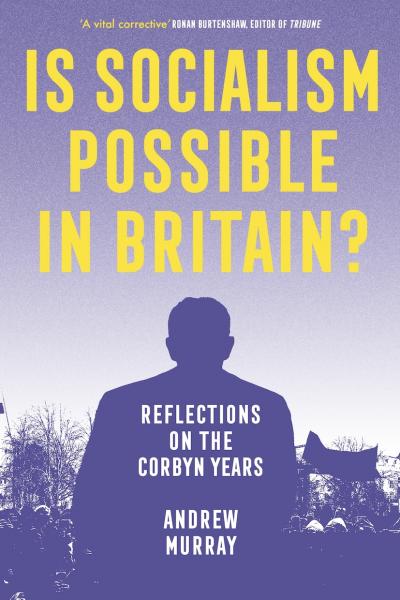The title of Andrew Murray’s new book poses a question that also vexed Friedrich Engels over 130 years ago. The German co-author of The Communist Manifesto despaired of English socialism, "that abomination of abominations", on the grounds that it had "not only become respectable but has actually donned evening dress and lounges lazily on drawing-room causeuses.”
The treacherous lure of the Establishment has indeed been a constant problem for Labour leaders from Ramsay MacDonald and Hugh Gaitskell to Sir Keir Starmer. Roy Jenkins, who narrowly failed to get the top job, was almost a caricature in this respect. All of them could talk the talk but were ultimately less interested in socialism than in social climbing.
So perhaps it's unsurprising that Murray doesn’t come up with an answer to the titular question. (Neither did Engels, by the way. He steered clear of those abominable drawing-rooms and focused instead on strike action in London's East End.) Murray's title is somewhat misleading anyway. More a memoir than a work of analysis, his book provides an often anecdotal account of Jeremy Corbyn's leadership as seen from the inside. A lifelong communist and veteran of the Stop the War coalition, Murray was unexpectedly seconded to Corbyn’s office by the trade union Unite to help counteract daily sabotage by members of the Parliamentary Labour Party and media.
In fact, two more immediate questions run through the book: is Labour a fit and proper vehicle for the pursuit of socialism, and can equality, social justice and ecological balance ever be attained via institutions like the British parliament?
A hundred years ago, in the aftermath of the Bolshevik uprising, the Labour Party made a deliberate ideological choice not to agitate for revolution but instead to take the long and winding parliamentary road to socialism.
 This ambivalent century-old legacy provided the context for Murray’s previous book, The Fall and Rise of the British Left, which was written at a time of peak Corbynism, following Labour’s unexpectedly strong showing at the 2017 general election. It told the story of a radical politician overhauling the historically conservative Labour Party. Published in the autumn of 2019, the book was, as the author himself admits, a spectacularly mistimed work, since the left in question was then teetering on the brink of a precipitous fall.
This ambivalent century-old legacy provided the context for Murray’s previous book, The Fall and Rise of the British Left, which was written at a time of peak Corbynism, following Labour’s unexpectedly strong showing at the 2017 general election. It told the story of a radical politician overhauling the historically conservative Labour Party. Published in the autumn of 2019, the book was, as the author himself admits, a spectacularly mistimed work, since the left in question was then teetering on the brink of a precipitous fall.
Is Socialism Possible in Britain? attempts to look at what went wrong and why Corbynism failed. Quite rightly, it points a finger of blame at the PLP, which fought Corbyn from the outset, displaying scant regard for his election by the wider party membership. The MPs' antipathy to Corbyn was based on Blairite opposition to his campaigning against imperialist wars, his disregard for neoliberal economic orthodoxies (including austerity) and, above all, his willingness to champion concepts often ignored by mainstream politics, such as public ownership and tax increases on business and the rich.
Yet Murray also candidly assesses the leadership’s mistakes, in particular its botched response to the anti-Semitism controversy and its dithering over Britain’s relationship with the European Union. The "Brexit blunder", as he calls it, alienated Labour leave-voters in the north of England's so-called "red wall" seats by appearing to disrespect the outcome of the 2016 referendum, and therefore missed an opportunity to re-frame the question to Corbyn's advantage. By the summer of 2017, according to Murray, most Remainers had set their sights no higher than securing a soft Brexit that would have left Britain aligned with the EU single market. Had the Corbyn leadership, still riding high after its June election triumph, backed Theresa May’s deal, it might have put the issue to bed by the time of the next general election at which Labour would have trounced the Tories with its alternative vision for a post-Brexit Britain.
It's hard not to agree with Murray that anti-Semitism in the Labour Party was dramatically overstated for political reasons by Corbyn's opponents. Yet he doesn’t deny that there were grounds for concern. Anti-Semitism did resurface within the Party but not more so, perhaps less so, than elsewhere in the rest of British society, often as a result of misdirected opposition to Israel’s apartheid against Palestinians. Yet the leadership’s response to toxic attitudes was belated and inadequate. However, it is worth pointing out that similar attitudes are routinely expressed in the columns of the Daily Mail and Daily Telegraph, both of which claimed that Corbyn himself was anti-Semitic – a ludicrous suggestion given his lifelong fight against all forms of racism.
Undeniably one of the causes of Labour’s declining support in England’s post-industrial regions is a basic historical fact: the industrial communities that gave rise to the Labour movement no longer exist. In other words, socialism may no longer be possible in Britain, if it ever was, through the agency of the Labour Party. Corbynism is now receding in the rear-view mirror of politics. Yet the social conditions that it addressed, from inequality and corruption to war and climate change, loom larger than ever – given the bankruptcy of neo-liberal economics – and that is why a similar movement, the next attempt to make socialism possible in Britain, will no doubt come along soon.
- Is Socialism Possible in Britain? Reflections on the Corbyn Years by Andrew Murray (Verso, £14.99)
- More book reviews on theartsdesk















Add comment